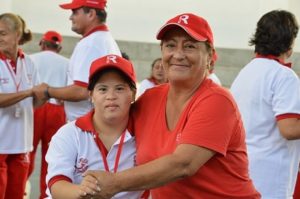- MN ABE Connect
- Archive
- Intellectual Disabilities
Intellectual Disabilities
Is it a learning disability or an intellectual disability?
PANDA often gets inquiries regarding students who are not making progress. Sometimes the cause of not making progress is a learning disability, but other times it is determined to be an intellectual disability. Check out PANDA’s Intellectual Disabilities category, which includes a list of organizations that may be more beneficial for some students than ABE classes.
Definition of Intellectual and Developmental Disabilities
 “Intellectual Disability is a disability characterized by significant limitations both in intellectual functioning (reasoning, learning, problem solving) and in adaptive behavior, which covers a range of everyday social and practical skills.” (From the American Association on Intellectual and Developmental Disabilities.)
“Intellectual Disability is a disability characterized by significant limitations both in intellectual functioning (reasoning, learning, problem solving) and in adaptive behavior, which covers a range of everyday social and practical skills.” (From the American Association on Intellectual and Developmental Disabilities.)
Since many disabilities are hidden, it is difficult to determine if a student has a disability or not, particularly an Intellectual Disability. If your student is not progressing and has hit a plateau in all subject areas, (meaning they are not showing much progress, if any, in any subject after six months to two years of instruction), they may have an intellectual disability. Go to the Adult Learner Intervention category for more information about determining the root of learning challenges.
PANDA’s Intellectual Disabilities chapter provides information describing the disability and organizations that provide job training, recreational and social skills opportunities. These organizations are often a better fit for some students than ABE.
To find a list of organizations that serve adults with intellectual disabilities, go to PANDA’s website.
Newsletter Signup
Get MN ABE Connect—the official source for ABE events, activities, and resources!
Sign UpArticle Categories
- ABE Foundations/Staff Onboarding
- ACES/Transitions
- Adult Career Pathways
- Assessment
- CCR Standards
- Citizenship
- COVID-19
- Cultural Competency
- Digital Literacy/Northstar
- Disabilities
- Distance Learning/Education
- ELA
- Equity/Inclusion
- ESL
- HSE/Adult Diploma
- Listening
- Math/Numeracy
- Mental Health
- Minnesota ABE
- One-Room Schoolhouse/Multilevel
- Professional Development
- Program Management
- Reading
- Remote Instruction
- Science
- Social Studies
- Speaking/Conversation
- Support Services
- Teaching Strategies
- Technology
- Uncategorized
- Volunteers/Tutors
- Writing